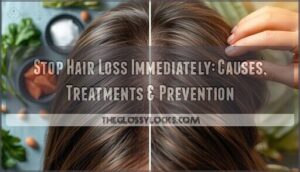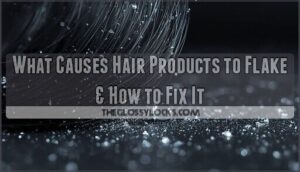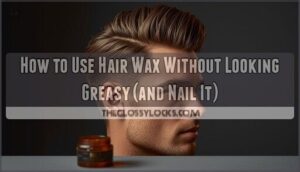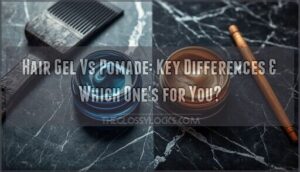This site is supported by our readers. We may earn a commission, at no cost to you, if you purchase through links.
You’re losing more hair than you should. When you run your fingers through your hair and find strands coming away, or notice your hairline creeping back, the panic is real.
The good news: hair loss isn’t always permanent, and you don’t need to accept it as inevitable. Most cases stem from identifiable causes—nutritional gaps, hormonal shifts, stress overload, or scalp inflammation—that respond to targeted intervention.
Once you understand what’s triggering your hair loss, you can take specific steps to stop the damage and encourage regrowth. From adjusting your diet to medical treatments proven to work, the solutions exist.
Table Of Contents
- Key Takeaways
- Causes Hair Loss
- Diet for Hair Growth
- Natural Hair Loss Remedies
- Medical Treatments Available
- Preventing Future Hair Loss
- Frequently Asked Questions (FAQs)
- What is the quickest way to stop hair loss?
- What vitamins are good for hair loss?
- What is the best treatment for hair falling out?
- Can hair grow back after thinning?
- How can I stop hair loss naturally?
- What does a dermatologist do for hair loss?
- How can I stop my hairfall immediately?
- What is the fastest way to stop hair loss?
- How do I stop my hair from thinning asap?
- Can stress cause immediate hair loss?
- Conclusion
Key Takeaways
- Hair loss stems from identifiable causes—nutritional deficiencies (iron, vitamin D, zinc, biotin), hormonal imbalances (DHT, thyroid, cortisol), genetic predisposition, or medical conditions—that respond to targeted intervention once you identify the trigger.
- The Mediterranean diet combined with adequate protein intake (55-110 grams daily) provides anti-inflammatory compounds, omega-3s, and essential nutrients that protect follicles from oxidative stress and reduce thinning risk through natural dietary patterns.
- Proven medical treatments include topical minoxidil (extends growth phase), oral finasteride (blocks DHT production), low-level laser therapy (stimulates follicles through photobiomodulation), and platelet-rich plasma injections (delivers concentrated growth factors), with combination therapy showing 84% maintenance rates.
- Prevention requires consistent habits—washing hair every 2-3 days with sulfate-free products, avoiding harsh chemicals like formaldehyde and PPD dyes, managing stress through daily breathing exercises and meditation, and scheduling dermatologist visits every 6-12 months for early detection and treatment adjustments.
Causes Hair Loss
Hair loss doesn’t happen without reason. Your body is sending signals that something’s out of balance, whether it’s the nutrients you’re missing, the hormones shifting beneath the surface, or the genes you inherited.
Even everyday products like your shampoo can play a bigger role than you’d expect in triggering or worsening hair loss.
Let’s break down the four main culprits so you can identify what’s actually causing your hair to thin.
Nutritional Deficiencies
Thinning hair often starts quietly in your kitchen, not your genes. When your body runs low on iron, hemoglobin drops and your follicles starve for oxygen—especially if you’re a woman dealing with heavy periods or restrictive eating. Low ferritin shows up as chronic shedding even when standard blood work looks normal.
Vitamin D deficiency shifts more hairs into early rest, causing excess fall you’ll notice in the shower. Zinc intake matters too, since your follicles need it for cell division and protein balance, and deficiency leads to brittle strands and breakage.
Biotin levels support keratin production, while severe protein shortages trigger widespread shedding roughly two to three months later. The Mediterranean diet delivers these nutrients naturally, protecting scalp health before damage starts.
Research shows a clear link between Vitamin D and hair growth, highlighting its role in preventing hair loss and promoting healthy follicles.
Hormonal Imbalance
Missing nutrients can push follicles toward shutdown, but hormones control when that switch flips. DHT, made from testosterone by 5-alpha reductase, binds directly to scalp receptors and shortens your growth phase—even when blood levels test normal, sensitive follicles still miniaturize.
Hormones, not nutrients, control when follicles shut down—DHT shrinks them even when blood tests look normal
Thyroid hormones regulate keratin genes like keratin 31, so low T3 weakens strands before they emerge. High cortisol from chronic stress floods your system with inflammatory signals, shoving more hairs into resting phase and triggering noticeable shedding months later.
For readers interested in understanding the science, this process is further influenced by genetic predisposition and hormonal factors.
Genetics and Aging
Hormones set the stage, but your DNA script writes the script. Androgenetic alopecia hits 80 percent of men and half of women over their lifetime, driven by genetic variants in androgen receptor genes that make follicles hyperresponsive to DHT.
As you age, follicle miniaturization shrinks hair diameter while stem cell exhaustion reduces your scalp’s regenerative reserves, creating the pattern baldness you inherit:
- Terminal hairs thin into wispy vellus strands you can barely see
- Growth phases shorten from years to months, increasing daily shedding
- Telomere shortening in follicle stem cells triggers earlier senescence
- Oxidative stress damages melanocytes, graying hair before complete hair loss
That genetic sensitivity compounds with each birthday, accelerating hair thinning even when hormone levels stay stable.
Medical Conditions
Your immune system can turn against you. Autoimmune diseases like alopecia areata create sudden bald patches when white blood cells attack follicles. Thyroid disorders—both underactive and overactive—cause diffuse thinning across your entire scalp over months.
Lupus symptoms include inflamed, scarring lesions that permanently destroy follicles. Chemotherapy effects and telogen effluvium from severe illness push follicles into premature shedding, causing noticeable hair loss treatment needs.
Diet for Hair Growth
What you eat directly affects your hair follicles and their ability to produce strong, healthy strands.
Pairing a nutrient-rich diet with daily scalp massage techniques that stimulate hair growth can amplify results and improve circulation to those follicles.
Research shows that specific dietary patterns and nutrient choices can slow hair loss and support regrowth better than others.
Here’s what the evidence tells us about which foods and eating approaches actually make a difference.
Mediterranean Diet Benefits
The Mediterranean diet fights hair loss prevention through five research-backed pathways. By loading your plate with olive oil, fatty fish, and colorful vegetables, you’re lowering scalp inflammation that damages follicles while boosting circulation to deliver oxygen and nutrients where they’re needed most.
- Anti-Inflammatory compounds in olive oil calm your scalp environment
- Omega-Rich fish like salmon strengthen follicle barriers and reduce dryness
- Healthy Fats from nuts provide Vitamin Support that shields cells from oxidative stress
- Antioxidant-packed produce fuels Hair Growth by protecting follicles from daily damage
Studies show this diet and hair health connection cuts thinning risk substantially through nutrition for hair growth promotion.
Protein Rich Foods
Your hair shaft is nearly pure keratin, which means adequate protein intake drives every strand’s strength from root to tip. Without enough daily protein, follicles simply can’t manufacture the sturdy fibers you need for hair growth and hair loss prevention. Studies confirm that low protein levels trigger shedding, while a protein-rich diet keeps your scalp productive and your hair thick. You need roughly 55 to 110 grams daily depending on your weight and activity level, which fits naturally into a Mediterranean diet approach.
Core food sources for nutrient balance and diet planning:
- Animal options – Eggs deliver 6 grams per serving plus biotin, while salmon offers 17 grams with omega-3s that nourish follicles directly.
- Plant choices – Lentils, tofu, and chickpeas supply complete amino acids vegans rely on for keratin production.
Vitamin a and Hair Health
Your follicles depend on vitamin A to push stem cells through the hair growth cycle and produce the keratin that builds each strand. Retinoic acid role involves binding to follicle receptors that control cell division, keeping more follicles active and fewer resting.
When vitamin A deficiency strikes, sebum production drops, your scalp dries out, and hair thins before shedding ramps up. Balance matters—excess vitamin A disrupts the cycle just as harshly, triggering brittleness and rapid loss until you restore healthy intake levels.
Essential Nutrients for Hair
Think of your hair as a construction site where protein, biotin, and vitamin A work around the clock to build keratin strands that resist breakage. Mineral deficiency and poor nutrient absorption undermine this process—zinc deficiency increases shedding, iron deficiency starves follicles of oxygen, and vitamin balance determines whether your hair grows or thins. Amino acids supply the raw materials keratin production demands daily.
Three nutrients you can’t skip:
- Iron and zinc – Deliver oxygen and repair hair tissue
- Biotin and B vitamins – Drive keratin production at the follicle
- Vitamin A – Regulate sebum and follicle cycles
Natural Hair Loss Remedies
You don’t always need prescriptions or expensive treatments to support your hair. Simple, natural approaches can strengthen your scalp and reduce breakage when used consistently.
Here are four evidence-based remedies you can start using at home today.
Scalp Massage Techniques
Gentle pressure works wonders when you massage your scalp 4 to 5 times per week. Use your fingertips in small circles across your entire head for 5 to 10 minutes per session—this Blood Flow Stimulation brings oxygen and nutrients directly to follicles.
Hand Techniques with light oils reduce friction while supporting hair growth. Skip vigorous rubbing to protect Scalp Safety, especially near your hairline where strands are most fragile.
Gentle Hair Care Practices
Ever noticed how treating your strands with care can be the line between shedding and thriving? Paying attention to how you cleanse, detangle, and dry makes all the difference in scalp health and hair loss prevention.
Your care routine should include:
- Gentle Detangling with a wide-tooth comb or soft brushing, always starting at the ends.
- Low Heat Styling or air drying after squeezing out water with a microfiber towel.
- Weekly Hair Masks that restore elasticity and boost scalp care.
Small changes transform your daily habits into a shield—preserving what you’ve grown.
Coconut Oil and Hair Health
Coconut oil stands apart because its lauric acid actually enters the hair shaft—something most oils can’t do. That penetration cuts protein loss by more than 40 percent, protecting your strands from washing and combing damage.
Apply it before or after shampooing to strengthen hair fibers and seal moisture inside. A scalp massage with coconut oil twice weekly also shifts your scalp microbiome toward healthier bacterial balance, supporting long-term hair health maintenance and scalp hydration methods naturally.
Olive Oil for Hair Growth
Coconut oil protects your hair shaft, while olive oil works differently—it conditions deeply and creates a healthier scalp environment. The oleuropein in extra virgin olive oil shows promise in animal studies for keeping follicles in their growth phase longer, though it won’t match prescription treatments for genetic hair loss.
For practical hair growth tips, warm one to two teaspoons of olive oil and massage it into your scalp for 5 to 10 minutes before washing. This boosts circulation and spreads moisture around follicles. You can also apply it as an overnight treatment on mid-lengths and ends, then shampoo thoroughly the next morning.
- Moisture barrier: Oleic acid penetrates strands and seals the cuticle, cutting friction damage from brushing
- Scalp health maintenance: Reduces flaking and tightness by limiting water loss from skin
- Natural protection: Antioxidants shield follicles from oxidative stress that triggers shedding
Skip olive oil if you have oily hair or dandruff—it can worsen both.
Medical Treatments Available
When natural remedies aren’t enough, proven medical treatments can halt hair loss and restore growth.
These options range from topical solutions you apply at home to sophisticated procedures performed in a dermatologist’s office. Each treatment targets hair loss differently, giving you multiple pathways to regain control of your hair health.
Minoxidil and Finasteride
Prescription medications deliver real results when you’re facing stubborn hair loss. Minoxidil effects include opening potassium channels in your scalp cells, which extends the growth phase and thickens miniaturized hairs. You’ll apply the 5 percent foam or solution directly to affected areas once or twice daily.
Finasteride benefits come from blocking the enzyme that converts testosterone to DHT, the hormone responsible for shrinking your follicles. Taking 1 mg daily lowers scalp DHT levels within two weeks, though visible hair regrowth usually takes six to twelve months. Using both medications together targets hair loss prevention from two angles.
Studies show 84 percent of patients maintain density with combination therapy, compared to lower rates with single treatments. You’ll need consistent daily use for ongoing hair restoration, and stopping either medication usually leads to gradual loss of the hair you’ve maintained. Expect some initial shedding in weeks two through eight as older hairs make room for stronger ones.
Low Level Laser Therapy
While medications work from inside your body, low level laser therapy takes a different approach through photobiomodulation. Red light between 630 and 850 nanometers targets follicle mitochondria and boosts ATP production, shifting more hairs into active growth.
FDA-cleared caps and helmets deliver consistent scalp stimulation for 20 to 30 minutes every other day. Expect gains of 17 to 67 hairs per square centimeter after 16 to 24 weeks in thinning areas.
This light therapy works best on miniaturized follicles rather than completely bald patches, giving you another practical hair restoration technique.
Platelet Rich Plasma Injections
Plasma injections tap into your body’s natural repair system to fight thinning. A dermatologist draws blood, spins it in a centrifuge to concentrate growth factors several times above normal levels, then injects the platelet-rich plasma across your scalp at one-centimeter intervals. Most people need three sessions spaced four weeks apart. Hair regrowth shows up gradually—less shedding first, then thicker strands and better coverage between three and six months. This follicle stimulation works best on miniaturized hairs from androgenetic alopecia rather than completely bald patches.
- Your own blood drives results – concentrated platelets deliver growth factors directly to weak follicles
- Treatment outcomes build over time – expect hair counts rising from 40 to over 60 hairs per square centimeter
- Maintenance keeps gains – follow-up plasma injections every four to six months help preserve density improvements
Hair Transplantation
Surgery moves permanent follicles from your donor zone to balding spots, giving you lasting regrowth other treatments can’t match. The FUE technique extracts individual follicular units using tiny punches, leaving scattered dot scars that heal fast.
Hair grafting delivers 10 to 80 percent visible improvement within three to four months. This hair transplantation procedure offers real hair restoration for stubborn baldness treatment when you’re done waiting.
Preventing Future Hair Loss
Once you’ve stopped active hair loss, the next step is keeping it from coming back.
Long-term protection means building habits that support your scalp and hair follicles every day. Here’s what works to maintain the progress you’ve made.
Maintaining Healthy Hair Habits
Your daily hair routine sets the foundation for hair loss prevention and long-term hair health maintenance. Wash when your scalp feels oily—every 2 to 3 days for fine hair, weekly for curly types—to balance natural oils without stripping protection.
Use gentle styling tips like wide-tooth combs on damp hair and loose hairstyles to reduce traction. These scalp care techniques and hair growth strategies, paired with healthy hair products, protect follicles from unnecessary damage.
Avoiding Harsh Chemicals
Your shampoo bottle could be making your hair fall out. Sulfate free cleansers protect cuticles from breakage, while sulfate based formulas like SLS strip oils and weaken strands. Chemical damage from formaldehyde straighteners and PPD dyes inflames your scalp and triggers shedding.
Phthalate awareness and fragrance reduction matter for hair loss prevention. Choose gentle products to support scalp care and hair health maintenance:
- Switch to sulfate free shampoos with glucosides that clean without stripping natural oils
- Skip formaldehyde smoothing treatments that release carcinogens and cause hair shaft breakage
- Use PPD free hair dyes or plant based henna to avoid allergic scalp inflammation
- Select fragrance free styling products to reduce endocrine disruptors like diethyl phthalate
- Read labels for parabens and alcohols that dry your scalp and lift cuticle scales
These hair care routines lower chemical exposure and protect follicles from avoidable damage during hair loss treatment.
Reducing Stress and Anxiety
Stress hormones can shove 70 percent of your follicles into shutdown mode, making anxiety management critical for hair loss prevention. Deep Breathing for five minutes daily activates your relaxation response and cuts cortisol by 25 percent over six months. Mindful Meditation strengthens emotional balance, while Social Connections buffer stress that triggers shedding.
| Practice | Frequency | Impact on Hair |
|---|---|---|
| Deep Breathing | 5-10 min daily | Lowers cortisol, protects follicles |
| Moderate Exercise | 3-4x weekly | Improves scalp blood flow |
| Mindful Meditation | 10 min daily | Reduces stress-related shedding |
| Quality Sleep | 7-9 hrs nightly | Promotes hair growth cycles |
Relaxation Techniques like scalp massage combine stress relief with direct follicle stimulation for hair growth. These habits protect your strands from anxiety-driven damage during hair loss treatment.
Regular Check Ups With Dermatologist
Routine dermatology visits catch widening parts and subtle thinning before bald patches take over, giving you more treatment options when interventions work best. Scalp evaluations during these appointments use tools like dermoscopy to spot miniaturized hairs and inflammation invisible in your bathroom mirror. Your dermatologist tracks how minoxidil or finasteride perform through hair loss monitoring over six to twelve months, adjusting strength or frequency when progress stalls.
Follow up care becomes essential for treatment adjustments—switching from topicals to platelet-rich plasma injections if over-the-counter products fail after six months.
- Schedule dermatologist visits every six to twelve months for baseline scalp care tracking
- Request hair pull tests and magnified follicle checks during each appointment
- Discuss medication side effects and visible regrowth during follow-up sessions
- Update your hair loss prevention plan as hormones, age, or health conditions shift
Frequently Asked Questions (FAQs)
What is the quickest way to stop hair loss?
The fastest approach blends removing triggers—like tight styles or crash diets—with topical minoxidil for hair growth prevention.
Nothing halts shedding overnight, but these steps slow loss within weeks while promoting rapid hair repair.
What vitamins are good for hair loss?
Biotin, iron, zinc, and vitamins A, C, D, and E all support hair growth by helping protein building, protecting follicles from damage, and fueling the active growth phase your hair needs.
What is the best treatment for hair falling out?
Ironically, the most proven hair restoration techniques won’t work overnight.
Minoxidil and finasteride remain gold-standard treatments, with minoxidil providing follicle stimulation through daily scalp treatment while finasteride targets hormonal regrowth therapy by blocking dihydrotestosterone’s hair revitalization interference.
Can hair grow back after thinning?
Yes, hair regrowth after thinning depends on the cause. Temporary shedding from stress or nutritional deficiencies usually reverses within three to six months once you fix the trigger.
Genetic pattern hair loss needs ongoing treatment like minoxidil.
How can I stop hair loss naturally?
Feeding your follicles right pays off. Combat thinning with protein-rich eggs, fish, and Mediterranean meals.
Daily scalp massage for four minutes boosts blood flow. Biotin supplements, stress management, and gentle hair care practices support natural hair growth and prevention strategies.
What does a dermatologist do for hair loss?
Your dermatologist examines your scalp, identifies the specific hair loss cause through testing, and prescribes targeted treatments like minoxidil or finasteride.
They create a tailored treatment plan and monitor your progress through regular follow-up care.
How can I stop my hairfall immediately?
You can’t stop hair fall overnight, but quick fixes help minimize breakage immediately.
Switch to loose hairstyles, massage your scalp gently, sleep on silk pillowcases, and apply coconut oil conditioning treatments to protect existing strands.
What is the fastest way to stop hair loss?
The fastest way to stop hair loss combines daily 5% minoxidil with immediate lifestyle fixes—addressing nutritional gaps, reducing stress, and removing triggers like crash diets—while oral finasteride targets hormonal causes in men.
How do I stop my hair from thinning asap?
Combine topical minoxidil with biotin supplements and a protein-rich diet to address hair thinning solutions quickly.
Add gentle scalp massage daily while consulting a dermatologist about prescription options for immediate regrowth and effective thinning prevention.
Can stress cause immediate hair loss?
Like a domino chain already set in motion, stress doesn’t strip your scalp overnight—most shedding surfaces two to three months later through telogen effluvium, when cortisol quietly shifts follicles into premature rest.
Conclusion
Your scalp sheds 50 to 100 hairs daily—that’s normal turnover, not a crisis. But when shedding accelerates beyond that baseline, you’re watching your body signal a fixable imbalance.
The strategies to stop hair loss immediately start with identifying your specific trigger—whether nutritional, hormonal, or inflammatory—then matching it to proven interventions. Target the underlying issue with precision, stay consistent with treatment, and your follicles will respond. Hair regrowth isn’t luck; it’s biochemistry under your control.
- https://mydoctor.kaiserpermanente.org/ncal/structured-content/hair-loss-alopecia-48889
- https://www.uclahealth.org/medical-services/dermatology/clinical-programs/specialty-clinics/hair-and-scalp-disorder-clinic
- https://www.urgentcare2go.com/WhatWeTreat/HairLoss
- https://xyonhealth.com/blogs/library/how-long-does-finasteride-take-to-work
- https://nyulangone.org/conditions/hair-loss/treatments/medication-for-hair-loss











